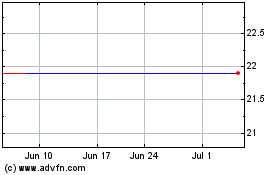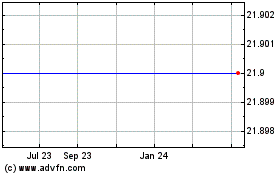Commercial Real Estate Owners Beginning To Walk Away From Properties
March 10 2010 - 10:05AM
Dow Jones News
Commercial real estate owners are walking away from properties
that have become untenable as investments, just as homeowners have
walked away from houses they can no longer afford to pay off or
sell.
The latest commercial property owner to do this is Vornado
Realty Trust (VNO), the $13 billion real estate investment trust,
which warned last week that it would walk away from two loans
totaling $235 million.
The trend is likely to escalate in coming months as more loans
mature and refinancing remains difficult and costly. As with
residential properties, there is less incentive for owners to hold
on to properties when the buildings are worth less than what is
owed on their mortgages.
"Frankly, I am surprised that we have not seen a lot more," said
Rob Little, chief investment officer of Cornerstone Real Estate
Advisers LLC, with $32 billion under his management.
Commercial mortgages are in the throes of a painful correction.
Delinquency rates are up, property values are nearly 40% off from
their peak valuations, occupancy rates and rents are down. Further,
as loans mature, many find it difficult to obtain fresh capital,
and so they seek extensions on current loans.
However, of late, some commercial property owners find that it
makes more economic sense for them to stop making payments and
servicing the debt, and walk away from a property. Since most of
these commercial loans are non-recourse, there is no direct
obligation or claim on the owners' assets.
In the residential market, the phenomenon is referred to as
"jingle mail," a reference to homeowners who surrender their
property by mailing the keys to the lender rather than go through a
formal foreclosure process.
An added factor is that in this recent credit cycle the stigma
attached to commercial real estate developers who walk away--which
previously meant investors would boycott the companies--has faded.
Investors have little recourse but to wait to see if protections
built into the bond offer a cushion from losses.
Little said that owners of properties that are well underwater
have been able to keep them afloat by taking advantage of low
interest rates engineered by the Federal Reserve to try to revive
the economy. But when it comes time to refinance, the numbers often
don't work anymore.
"Current valuation (on property) lurks out there when loans
mature," Little said.
Vornado, for instance, said a subsidiary would not make up any
shortfalls in the debt service on loans secured by properties in
High Point, N.C. At the end of 2009, the net book value of the
properties was about $148 million; the debt secured by these
properties is $218 million.
Other well-known and well-funded operations have opted to do
this as well, said Aaron Bryson, analyst with Barclays Capital.
BlackRock Inc. (BLK) and Tishman Speyer Properties gave control
of Stuyvesant Town/Peter Cooper Village housing complex in
Manhattan to creditors. They bought the property for $5.4 billion,
and its current value stands at less than $2 billion.
This trend, analysts say, came to the fore last fall when
Maguire Properties Inc. (MPG), a large office building owner in
Southern California, handed over the keys to seven towers to
creditors.
"These sponsors have the ability to support the debt, but choose
not to," Bryson said. "It comes down to pure economics."
Most property owners will first try to modify or workout a loan
to keep alive the possibility of gains when the market recovers,
Bryson said.
"But if a property is deeply underwater, and the cost of
modification is too high," he added, "then it can make sense to
walk away."
If these loans have been bundled into commercial mortgage-backed
securities, as most are, then investors in the bonds--especially
those who own parts backed by subordinate debt--are likely to be
most affected quickly.
"If you are a triple-A holder, you are counting on protection
and support that is built in," Little said. "If you are a
subordinate bond holder, you are deeply concerned about it."
However, there's little else these investors can do.
"You can complain all you want, but you are not going to get
anything," Bryson said. "Most CMBS loans are non-recourse, so an
investor has no claims on other sponsor assets."
-By Prabha Natarajan, Dow Jones Newswires; 212-416-2468;
prabha.natarajan@dowjones.com
METALDYNE PERFORMANCE GROUP INC. (NYSE:MPG)
Historical Stock Chart
From Mar 2024 to Apr 2024

METALDYNE PERFORMANCE GROUP INC. (NYSE:MPG)
Historical Stock Chart
From Apr 2023 to Apr 2024
